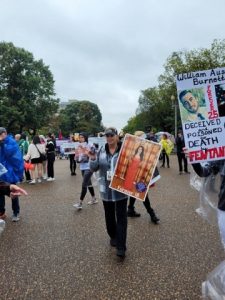Mother starts a movement
By Kevin Beese Staff Writer — October 3, 2023
Terry Almanza, a retired Chicago police officer and founder of Drug-Induced Homicide Inc., walks Sept. 23 in the rainy 3rd annual National Rally for the Lost Voices of Fentanyl organization. (Photo courtesy of Terry Almanza)
Third in a series on drug-induced homicides
Terry Almanza wanted someone to be held accountable for the fatal drug her daughter ingested.
Her daughter, Sydney Schergen, died in 2015 in Chicago after taking a fatal dose of ecstasy. Schergen died of MDMA poisoning.
Almanza, a 28-year member of Chicago Police Department, found a 1988 statute on the Illinois law books that allowed for the criminal prosecution of individuals supplying fatal drugs. Almanza assumed Chicago police would launch a criminal investigation. Chicago police told her that they were not going to pursue the case criminally.
Almanza began researching drug-induced homicides and met lawyers, nurses and other professionals who had lost a child to illicit drugs. As her research continued, she began connecting with parents in other states who had lost a child to drugs laced with fentanyl.
“Illicit drugs are now the leading cause of death for Americans ages 18-45,” Almanza said. “We need to stop the epidemic with accountability.”
Seeing other parents in other states go through the same frustration she did of no one being held accountable for their child’s overdose, Almanza started Drug-Induced Homicide, Inc., a national nonprofit aiming to get police and prosecutors to pursue criminal charges in fatal drug-ingestions. The organization has chapters in all 50 states.
“We are focused on the judicial aspect, to try to create a shift from ruling these accidental deaths to criminally charging people in these cases,” Almanza said. “We need to get away from classifying these deaths as accidents and treat them as the homicides that they are.”
Almanza is one of the few parents who have lost a child to drugs to see justice served. Two people were convicted of providing Sydney Schergen with the fatal dose of ecstasy. Most parents don’t see that justice.
Almanza said there have been 12,000 opioid deaths in Cook County since 2015 and her daughter’s case is one of only five Cook cases she knows of where there have been convictions.
“We love the police. We love prosecutors, but more can be done,” Almanza said. “We want to be in partnership with them. We want sellers prosecuted criminally.
“It is not a happy ending to our loss, but it means another family will not have to deal with a horrific tragedy.”
The Drug-Induced Homicide, Inc. founder said her organization also wants to work with judicial systems throughout the country.
“We want to make sure these deaths stop and that no more lives are lost,” Almanza said. “Our main goal is to save lives.”
Almanza was in Washington D.C. on Sept. 23 to participate in the 3rd annual National Rally for the Lost Voices of Fentanyl organization.
During her presentation, Almanza asked the audience to stand if they had lost a loved one to illicit drugs.
“Then I asked them all if they received justice to stay standing. I would say only about 3 percent of the people remained standing,” she said.
Almanza said it is common for parents who have lost a child to illicit drugs to be involved in efforts to try to stop overdoses.
“You have this pain, and you have to do something with it,” Almanza said. “There are parents who distribute Narcan (an overdose antidote), parents who do talks at schools, parents who go to prosecutors, and parents who address policy.”
Almanza said she has seen progress in more cases being pursued criminally than when she started Drug-Induced Homicide, Inc. in 2015.
“When I started eight years ago, I would go online looking for cases where there were prosecutions and indictments and they were far and few between,” Almanza said. “We are starting to see the judicial system treat these deaths like homicides.”







